Experiencing All of Ecuador Through Adventure Disguised as Class Past Review
By Gabby L (Biology and Biomedical Sciences, Presbyterian College) - abroad from 08/17/2015 to 12/13/2015 with
Universidad San Francisco de Quito: USFQ Galapagos Semester Program
I learned to "see with my intellect" meaning that I applied what I learned to everything I saw around me in the natural world. Personally, I learned to enjoy taking life at a slower pace and to got out of my comfort zone to experience more.
Review Photos
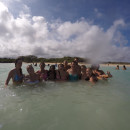
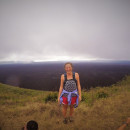
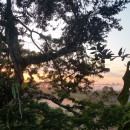
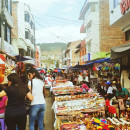
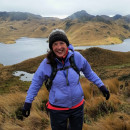
Personal Information
| How much international exposure did you have prior to this program? | None |
Review Your Program
|
* Overall educational experience
Academic rigor, intensity, resources, etc. |
The classes were 3 weeks each, one after another. I was in the Evolution and Ecology track with 5 classes, which I could switch out for 1 or 2 classes one of the other tracks (marine biology, University of Miami, or politics & conservation). The classes concentrated a lot of information and work in 3 weeks, which made them pretty intense on a study abroad level. However, they were amazing classes, and they have helped me so much as a biologist. Also, all the classes had at least a few field trips, which were amazing opportunities to experience every aspect of the ecosystems of mainland Ecuador and the Galapagos. |
|
* Host Country Program Administration
On-site administration of your program |
They can be a little disorganized sometimes, but they're always there for you if you needed them. |
|
* Housing:
How satisfied were you with your living arrangements? |
I had host families in both Quito (for a month) and on the Galapagos (for 3 months). It was the most immersive aspect of this program, especially for learning conversational Spanish quickly. They were very attentive to what I needed, and cared for me as part of their family. |
| * Food: |
The food was not too diverse, but I definitely became accustomed and quite attached to it. Everything is served with rice. However, the fresh fish on the Galapagos is everywhere and it's the best food experience on the islands. The fresh juice, fruit, plantains, and soup are also a fantastic Ecuadorian experience. Be prepared to potentially spend $4 on average for lunch everyday in the Galapagos. Also, dinners on Friday and Saturday aren't provided and they can easily border on $8-10. |
|
* Social & Cultural Integration:
How integrated did you feel with the local culture? |
We were the only students our age on campus during our class times. We tended to stick together, which made for a strong program community. Since it was a small town (about 7000) on a small island, we got to know the town and people very well. It was difficult to get to the know locals because of the language barrier. |
|
* Health Care:
How well were health issues addressed during the program? |
I got sick twice, and the program has you go to the hospital with a program coordinator to translate. It was quick and free, and I had no problems getting cared for. I needed the yellow fever vaccine to go to the Amazon. I also strongly suggest the Hep A vaccine to avoid food-related sickness. |
| * Safety: |
It was never a huge concern to walk home by myself at night. To be honest, the local men can be a little forward with their advances and that was the only time I felt uncomfortable -- never truly threatened though. |
| If you could do it all over again would you choose the same program? |
Yes
I was given once-in-a-lifetime opportunities to see some of the rarest, untouched natural areas in the world. This program also provided the best biology abroad program experience. |
Finances
|
* Money: How easily were you able to live on a student's budget?
(1 = not very easy/$200+ on food & personal expenses/week, 2.5 = $100/week, 5 = very easily/minimal cost) |
|
| Not including program expenses, about how much money did you spend on food and other expenses each week? | About $50 but definitely varies based on whether or not your paying for a lot of trips - especially to other islands or places on mainland Ecuador. |
| Do you have any general money-saving tips for future study abroad participants? | Keep close track of your cash-flow, especially because all the spending is with physical cash which can be difficult to track. Transportation and food are relatively cheap. On the island, most people don't ever have to use a taxi because you can walk everywhere or borrow a bike. People save even more money by buying lunch supplies. |
Language
| * Did your program have a foreign language component? | Yes |
|
How much did the program encourage you to use the language?
0 = No encouragement, 5 = frequent encouragement to use the language |
On top of the beginning crash-course in Spanish, they offer additional opportunities for an intermediate class midway through the semester. My host families were the most important immersive learning experience. |
| How would you rate your language skills at the beginning of the program? | Beginner |
| How would you rate your language skills at the end of the program? | Intermediate |
| What was the highest level language course you had completed prior to departure? | 3 years of spanish in high school |
| How many hours per day did you use the language? | |
| Do you have any tips/advice on the best ways to practice the language for future study abroad participants? | I found language-learning apps such as Duolingo are very good for refreshing yourself on the language. |
Direct Enrollment/Exchange
| * Did you study abroad through an exchange program or did you directly enroll in the foreign university? | Exchange |
Other Program Information
|
* Where did you live?
Select all that apply |
|
|
* Who did you live with?
Select all that apply |
|
|
* Who did you take classes with?
Select all that apply |
|
| About how many local friends did you make that you will likely keep in touch with? |
A Look Back
| * What did you like most about the program? |
|
| * What could be improved? |
|
| * What do you know now that you wish you knew before going on this program? | If you have the money, get diving certified earlier on, when you arrive on the island. The more background in spanish you get before you arrive, the more immersive experience you will have. |
Reasons For Studying Abroad
| To help future students find programs attended by like-minded individuals, please choose the profile that most closely represents you. |
The Avid AdventurerThe wardrobe you packed was better suited for a semester of camping than club hopping. Outdoorsy, you might forgo a crazy night out for an early all-day adventure. You'd rather take in the rich culture of an old town than the metropolis of a modern city, but for you getting off the grid is ideal. |








